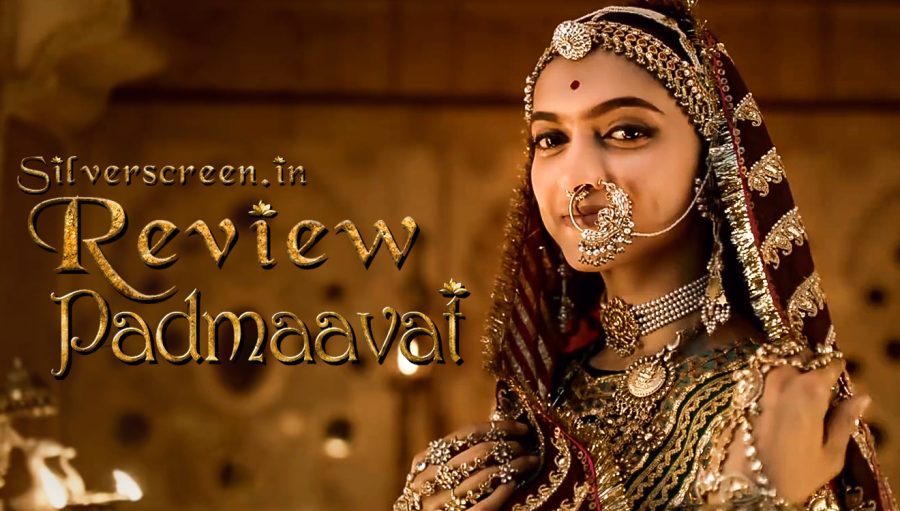Watching Padmaavat is no joy ride, one has to constantly keep an eye on the exit in case things escalate to something unfortunate. The effusive use of red and saffron colours, the clanking of armours and the gold baubles, the fire of sacrifice that pervades the screen towards the end, the hackneyed dialogues – over two years after Bajirao Mastani, Sanjay Leela Bhansali is undoubtedly hungry to outdo himself.
He has done his bit towards making the film look grandiose, perhaps dreaming the same dream that the makers of Baahubali, Game Of Thrones had. The story, however, isn’t a priority here. It’s not even enough to leave the descendants of Rajputs shaken. So why the outrage, one wonders.
***
Padmaavat, in essence, is about three protagonists – Rani Padmavati (Deepika Padukone), Raja Ratan Singh of Mewar (Shahid Kapoor), and Alauddin Khilji (Ranveer Singh) but there are other crucial characters too, such as Jalaluddin Khilji (Raza Murad), Mehrunissa (Aditi Rao Hydari), Malik Kafur (Jim Sarbh), and Guru Raghav Chetan (Aayam Mehta).
Padmavati is a Sri Lankan princess who likes to hang from trees, go hunting. It’s during one of her hunting expeditions that her arrow fortuitously finds Ratan Singh, who at first is shocked but simmers down upon gazing at Padmavati. She, too, reciprocates almost instantly, briefly forgetting that there’s an arrow between them. Having visited Sri Lanka with the aim of finding pearls for his first wife, Ratan Singh ends up walking away with what is suggested as a “much better deal” – a brand new trophy wife.
Almost too perfect to function, the Sri Lankan princess who loved hunting and hanging around nature, begins a life that involves her perpetually getting dressed, adjusting her jewellery, stitching pearls on her husband’s turban, dressing him up, fanning him while he eats, and praying for his long life at the temple that houses hundreds of trishuls. Rani Padmavati appears to be the perfect domestic help goddess.
Way up north, somewhere in Afghanistan, there’s a man who loves the feeling of blood on his face and laughs maniacally for every little thing that mildly amuses him. He is supposed to be barbaric and uncouth, but what he really needs is a good shower. Alauddin Khilji is portrayed as the spawn of Satan who kills without flinching to usurp the throne, cheats on his wife on his wedding day, and loves to eat meat. The latter part is hinted as a character flaw for some reason.
He hears of Padmavati’s beauty from Raghav Chetan, a Brahmin priest and former advisor to Ratan Singh who was banished from Mewar for trying to watch the newlyweds make love. Hell hath no fury than a scorned priest. He runs to Alauddin and uses Padmavati’s beauty as a bait to create a rift between the two rulers.
In the midst of all this, Ratan Singh frequently launches into monologues on Rajput गुरूर (pride), that is supposed to be his strength but really is his biggest character flaw. And when he’s not talking about Rajput honour, he’s berating his wife for taking interest in the whole Alauddin-being-obsessed-with-her issue. “You don’t have any rights to take part in this matter. We men will fight and die if need be. But all with Rajput valiance in our blood,” he says with his perpetual stern face.
The Singhal princess, who once was so carefree, now has no agency over matters related to her, agrees with her sullen husband because she is the ideal Mewar queen. Three cheers for Rajput गुरूर !
Mehrunissa, Alauddin’s wife is in a similar predicament. She watches her brutish husband philandering, beheading her father, and perennially talking about wreaking havoc everywhere because that’s who he is.
The two women – Padmavati and Mehrunnisa – with stronger personalities are reduced to props that the men squabble over, with toxic masculinity looming so high that it almost chokes you.
***
Deepika Padukone, portraying a character whose name is in the title of the film, is given fewer dialogues when compared to her male counterparts. Portrayed as a person with zero imperfections, almost a goddess, Deepika is all poise and grace with expressions that make up for her fewer dialogues. But there’s hardly much to write home about her performance.
Ranveer Singh as Alauddin is animated at best. That’s not necessarily a bad thing because he appears to be the only one who is having fun with his character. A drab film with terrific settings, when you watch Ranveer talking or laughing, you know you aren’t watching a brutish Alauddin but the actor straight out of his Instagram profile. But that’s what really saves the film from being an utter bore.
Shahid Kapoor, who has really won us over in the past with films such as Kaminay, Haider, Rangoon is so uni-dimensional here. You can’t really blame him considering his role demands a certain amount of rigidness, even though you long to watch him play around a bit with his character, kick back his shoes and repeat the same monologue on Rajputs in a tone that he’s more comfortable with.
Aditi Rao Hydari is perhaps the actress who goes home with better dialogues even though she plays a supporting role. She excels at playing the woman who silently suffers, the woman who has endured much more than most but still maintains her own stand, her own voice. A fascinating character, it would’ve been something had they emphasised more on her when she turned against her husband.
Jim Sarbh, portraying the eunuch, enters the scene with some badassery. But, sadly, resorts to stereotypes of eunuchs talking with an accent and an effeminate gait, sometimes used as a comic relief and other times just to show why his “outlandish” behaviour resonates with someone like Alauddin.
***
The makers have been emphasising from the beginning that the film cannot be a distortion of history since it is a fictional take on an already fictionalised story. Hiraman Tota, the parrot from Malik Muhammad Jayasi’s poem, is a human in the film, perhaps for credibility. Padmavati’s beauty is praised to the skies but what is subtly suggested is that Alauddin’s obsession with her stems from her being the proverbial forbidden fruit.
Putting all the arguments of distortion of history aside, the film is so pro-Rajputs that the Karni Senas’ ’56-inch chests’ would swell with pride. And that speaks volumes here.
Bhansali does, however, deserve credits for envisioning and constructing palaces with Rajputs of yore carved on the walls, precious stones glittering from thrones, and bright lotuses that instantly make a dark and dingy kingdom more tasteful. Bhansali’s creation and vision is stamped on the work that has gone into creating the sets, the costumes, the cinematography, and the special effects.
Then again, the story he chose to tell at a time when women have started to speak up against abuse, misogyny and patriarchy and being perennially subjected to the male gaze, couldn’t have been a bigger let down. The scene where Padmavati seeks her husband’s permission to commit jauhar to protect her dignity is so cringe-worthy that it is almost unwatchable. And all the hoots and claps at the theatre that the scene elicited, paints a far more troubling picture of the glorification of a practice that was abolished for a reason.
Recommended
There’s often been an argument that women’s achievements in history have been overlooked. That their identities were more than just their famed beauty or them standing by the men in their lives. Shekhar Kapur’s Elizabeth, Shyam Benegal’s Zubeidaa, Hilary Mantel’s The Wolf Hall or Netflix’s The Crown advocate this argument. With Padmaavat, it would have been more comforting had the outrage been directed towards the treatment of women and the hopes of Bhansali veering from any glorification. But, the conspicuous presence of red and saffron, and the fire that occupies the screen towards the end connotes otherwise and it is deeply disturbing.
***
The Padmaavat review is a Silverscreen original article. It was not paid for or commissioned by anyone associated with the movie. Silverscreen.in and its writers do not have any commercial relationship with movies that are reviewed on the site.


